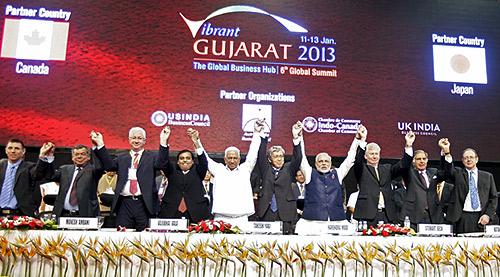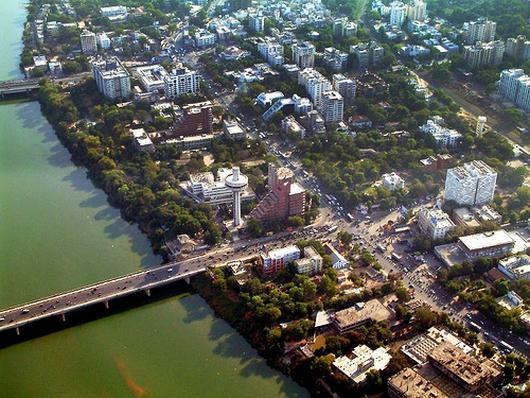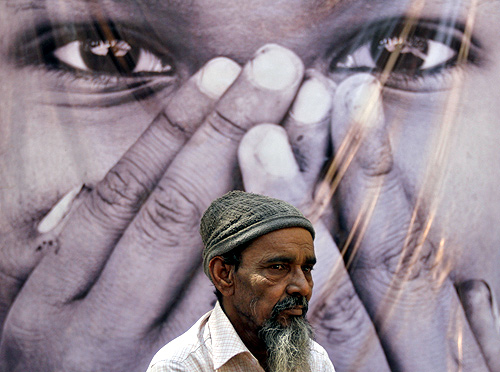 | « Back to article | Print this article |
Is Gujarat as 'vibrant' as Modi markets it?
The writer feels that though Gujarat has made rapid economic progress, the growth has not been inclusive.
Gujarat is vibrant and shining, so say the hoardings and statistics. I have had a chance to check this out after a fashion on periodic visits to places like Anand and Baroda but, strangely, missed out on Ahmedabad.
Still, a drive down a shining new highway from a shining new airport terminal to a permanent showpiece like the National Dairy Development Board campus tells you no more than what prospective in-laws see in a girl decked out by her parents to impress.
A quick visit to the state's capital after decades finally gave an idea of how things have changed and yet remain anchored in the odd critical way.
As we tucked into the hotel's tasty buffet spread - which included the mandatory chicken dish, like anywhere else in the country - I realised how mainstream the city had become.
I amused my far younger companions by recalling what it was like four decades ago. If you wanted to dine out on non-veg food, there was a single restaurant to go to, Kwality; and it was not terribly crowded.
What amazed me then was the way the city gorged itself on ice cream. It obviously made the women look good, with one qualification.
A good bit of the ice cream settled on the middle and flared out, making every other woman an aspiring Asha Parekh. Strangely, the ice cream rolled off the men without any impact whatsoever.
How much ice cream can a youngster, just out of a college that made a fetish of breaking rules, have?
Click NEXT to read further...
Is Gujarat as 'vibrant' as Modi markets it?
At my cousin's suggestion we took an occasional day trip to Baroda to get a feel of cosmopolitan liveliness, imparted by the NRI students from East Africa at the MS University, which was like a little gem in a finely crafted princely state, which itself was a similar gem in the bigger context of the country. MS University today has lost much of its earlier shine.
But Ahmedabad, economically at least, has travelled light years in the opposite direction in these decades, the pace picking up in the last.
The newer parts of the city are plain posh. Good wide roads carry loads of swanky cars getting in and out of well-done-up apartment blocks. The Volkswagen showroom fits in nicely, as does the exceptionally large Nokia Priority.
Perhaps the biggest change has taken place at the riverfront. The Sabarmati is now all banked over by embankments, matching in colour the buff of the semi-arid country around.
It prompted a first-time visitor with me to recall one of Europe's most famous capitals, which also has a neatly embanked river running through it.
What I wondered was whether the first inhabitant of Sabarmati Ashram would have approved this banishment of the natural and god-given, replaced by brick and mortar, standing testimony to man's desire to tame nature and aspire to omnipotence.
Across the river, the scene changed quickly. The glitz gave way to downmarket tumble-down India. It rang a bell: I spotted a road sign pointing to Khanpur where in 1969 I had stayed with my relatives.
Click NEXT to read further...
Is Gujarat as 'vibrant' as Modi markets it?
The families in the two-room cheek-by-jowl flats knew each other and all about each other well.
It was clear that over the years the great divide between the new and the old city, right and wrong side of the river, Hindu and Muslim neighbourhoods, had grown - as had the emotional divide between communities.
As I go over all the sights and smells I have taken away from this visit, I realise that the roots of the brutality of 2002 had been sown far earlier.
I remembered discussing basic fault lines with my uncle, who had post-college come to seek his fortunes in the textiles industry - like so many other young men from West Bengal - and over time became a pillar of the local Bengali community and one of the city's most successful Durga Pujas.
In 1969 the issue was the same; only the scale was smaller. The admonitions of the Frontier Gandhi, Khan Abdul Ghaffar Khan, in India for the centenary of the Mahatma's birth, over the troubles then, rang loud in our ears.
As we drove by, an unusual spectacle greeted us. What looked like a massive roadside market for second-hand clothes was on.
There seemed to be no dearth of people ready to haggle over and buy second-hand clothes, as must have been with those who were ready to pass them on for a consideration. For those at that market, things have not changed much in vibrant Gujarat.
The writer can be reached at subirkroy@gmail.com



